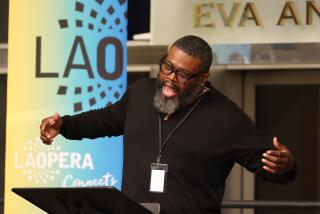Russell Garcia dies at 95; arranger, composer and conductor
Russell Garcia, an arranger, composer and conductor who was an influential figure in the West Coast music scene during the 1950s and ‘60s and whose work in Hollywood included writing the score for the 1960 science-fiction classic “The Time Machine,” has died. He was 95.
Garcia, who walked away from his career in Hollywood in the mid-’60s, died of cancer Sunday at his home in Kerikeri, New Zealand, said his wife, Gina.
During his eight-decade career in music, Garcia recorded more than 60 albums under his own name, including the otherworldly sounding “Fantastica: Music From Outer Space” and the avant-garde jazz album “Wigville” in the 1950s.
Garcia also arranged for artists such as Louis Armstrong, Ella Fitzgerald, Judy Garland, Stan Kenton, Julie London, Anita O’Day, Oscar Peterson, Mel Torme and Margaret Whiting.
That included arranging — and conducting — Armstrong and Fitzgerald’s classic 1958 “Porgy & Bess” album.
Garcia also was known for his signature four-trombone band, which he used on recordings with singers such as O’Day, Frances Faye and, more recently, Shaynee Rainbolt.
Garcia, who orchestrated Charles Chaplin’s 1952 film “Limelight,” was under contract at Universal as an arranger, composer and conductor in the 1950s and early ‘60s.
His years at Universal included composing the theme and numerous scores for the 1960s NBC western “Laredo” and writing the score for the 1966 movie comedy “The Pad and How to Use It.”
Garcia’s “Fantastica” album caught the attention of director George Pal for whom he scored “The Time Machine” and “Atlantis, the Lost Continent” (1961).
A post-World War II stint teaching at the Westlake School of Music in Los Angeles led Garcia to write “The Professional Arranger Composer.” The book has been translated into six languages and is still used in universities and music conservatories around the world. It was followed by “The Professional Arranger Composer Book II.”
“While he was here and active, Garcia was very much admired for the breadth of his skills as an arranger and a composer and then became even more influential by virtue of these books,” said music critic Don Heckman. “They continue to be basic handbooks for anyone who wants to understand the process of arranging and composing.”
In 2005, the Los Angeles Jazz Institute honored Garcia for his more than 60 years of contributions to jazz.
One of five brothers, Garcia was born in Oakland on April 12, 1916.
Self-taught on a cornet bought by one of his brothers for $5, he began writing music when he was about 8 and was only 11 when the Oakland Symphony Orchestra performed his arrangement of “Stardust.”
Garcia started a jazz band in junior high school and by high school was working five nights a week playing trumpet in a band that played in a San Francisco hotel.
After a year at what is now San Francisco State, he dropped out and went on the road with the band before moving to Hollywood in the late 1930s to study music and conducting.
He was a staff composer and arranger for NBC radio before serving in the Army infantry in Europe during World War II.
In 1966, Garcia and his wife sold their home in the Hollywood Hills and most of their possessions and set off on an around-the-world trip on a 41-foot trimaran.
But it wasn’t just a pleasure cruise.
“We were members of the Bahai faith and we were going to be visiting the Bahai communities around the world and sharing it with anyone who would be interested,” Gina Garcia said.
They had planned their trip to last for at least three years before returning to Hollywood. But, she said, they fell in love with New Zealand after arriving there in late 1971.
During his many years in New Zealand, Garcia continued to compose, arrange for various singers and conducted much of his original music with the New Zealand Symphony Orchestra.
In 2009, Garcia and his wife were awarded the New Zealand Order of Merit from the Queen of England for their service to music.
“The Unquenchable Flame,” an opera Garcia wrote in the mid-’90s with his wife, who wrote the libretto and lyrics, will have its world premiere in Auckland in July.
In addition to his wife of 59 years, Garcia is survived by a daughter, Judy Kulp; four grandchildren; and seven great-grandchildren. His son, David, died in 2007.
More to Read
Start your day right
Sign up for Essential California for the L.A. Times biggest news, features and recommendations in your inbox six days a week.
You may occasionally receive promotional content from the Los Angeles Times.




















































